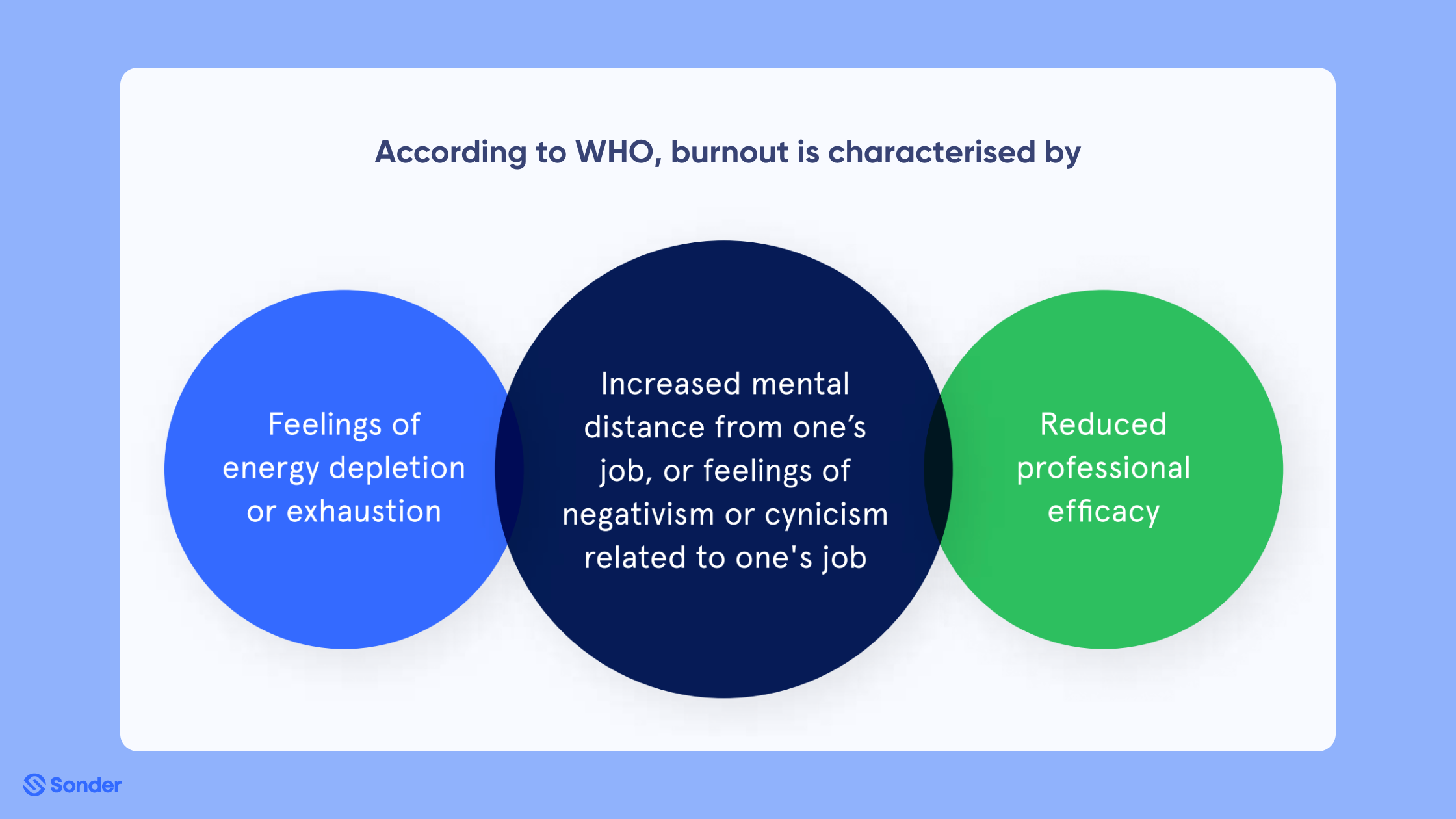Almost half (49%) of Australian and New Zealand employees are experiencing feelings of ‘burnout or exhaustion’ according to our latest survey*.
Despite this, only 35% of the 2,007 employees we surveyed said they took time off for their mental health in the past year, and 8% took no time off at all.
With so many employees hesitant to take time off, and attempting to keep working while feeling burnt out, HSC and P&C teams are at risk of low engagement scores, unplanned leave, higher levels of turnover – and even claims and reputational damage associated with unchecked psychosocial risks.
Our new guide assesses the survey statistics, shares additional Sonder data, addresses the multifaceted nature of burnout, and features expert advice on how to manage the risk. Download it here, or keep reading for a preview of some of the insights you’ll find inside.
What is burnout?
While closely linked, burnout is not simply stress. It’s a syndrome that can result from chronic and unsuccessfully managed stress, among other factors.

While burnout is often linked to knowledge-based roles, with their long office hours and demanding deadlines, the risk of burnout is pervasive across industries. In skills-based roles that deal directly with customers or patients, there can still be a high risk of burnout.
As The National Library of Medicine explains: “Within such occupations, the prevailing norms are to be selfless and put others’ needs first; to work long hours and do whatever it takes to help a client or patient or student; to go the extra mile and to give one’s all”. It also points out that as other roles have become more oriented to “high‐touch” customer service, burnout has become relevant for these jobs as well.
Sonder data supports this view. Workers in the retail trade are the most likely to report feelings of stress, when reaching out to Sonder for support.
Retail workers account for almost half (49%) of the tens of thousands of Sonder member cases recorded between January 2022 – February 2024
Sonder member data
A reluctance to take time off
Despite half of the 2,007 employees we surveyed reporting feelings of burnout, only 63% took a planned holiday.
Data from thousands of Sonder ‘member cases’ over the past two years suggests there is a dip in stress-related cases (a precursor for burnout) around December and January, when many of our Australian and New Zealand members will take time off for Christmas and summer holidays, suggesting that it’s an important part of stress management.

In our survey, 43% of respondents reported a slightly or significantly increased level of wellbeing throughout the holiday season. 29% said it made no difference and 27.5% said it made it slightly or significantly worse.
Research has demonstrated the benefits of downtime and rest on overall health and mental capacity, and generous paid time off (PTO) offers are highly regarded by job seekers. And yet, our data suggests that employees might not be taking time off to rest, recuperate and take a break. Even if they’re feeling exhausted.
Deloitte wrote about this in their ‘The disconnect disconnect‘ report suggesting “It may be time for organisations to fix a disconnect between their time-off policies and culture around using it.”
Download our burnout report for more insights
Despite this data, looking at burnout as an issue that can be fixed with holiday alone is misleading. Wellbeing is multifaceted and Sonder data reveals that when stress is present, there are often other issues at play.
Our report shares expert strategies on mitigating this complex psychosocial risk from Mark Oostergo, Chief Executive at Australian Psychological Services, plus actionable leadership advice from Raechel Gavin, Chief People and Culture Officer at Sonder.
Download it to discover the full data set, plus their insights.

About Sonder
Sonder is a technology company that helps organisations improve the wellbeing of their people so they perform at their best. Our mobile app provides immediate, 24/7 support from a team of safety, medical, and mental health professionals – plus onsite help for time-sensitive scenarios. Accredited by the Australian Council on Healthcare Standards (ACHS), our platform gives leaders the insights they need to act on tomorrow’s wellbeing challenges today.



